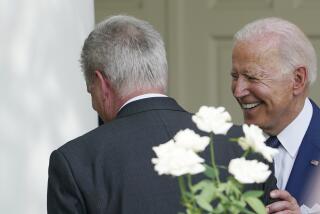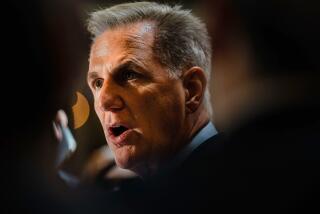Argentina Starts Debt Swap Amid Stalemate
- Share via
BUENOS AIRES — On the day that Argentina launched an emergency “debt swap” that some analysts saw as a de facto default on its massive debt, the fate of the nation’s economy remained uncertain Tuesday thanks to a political stalemate with powerful provincial leaders.
The standoff is an embarrassment and a potential economic crisis for President Fernando de la Rua, who is scheduled to leave Thursday for New York and Washington for a series of meetings with President Bush, U.S. Treasury officials and International Monetary Fund representatives.
The IMF and other institutions are demanding that the Argentine government reach a budget agreement with provincial governments as part of a $22-billion rescue package. The governors say the federal government is trying to balance its budget by raiding provincial treasuries.
“Time is running out,” Chrystian Colombo, the president’s chief of staff and lead negotiator with the governors, said during one of a series of tense telephone conversations with the provincial leaders this week.
At the same time, De la Rua’s administration faced criticism abroad from an increasingly skeptical financial community as it launched the swap of $60 billion in existing bonds for new debt at lower interest rates. Rating agency Fitch said the debt exchange is unlikely to be voluntary, as the government insists, and is likely to cause losses for investors.
Without an agreement between De la Rua and the provincial governments, global investors will have even less confidence that Argentina can avoid a complete default on its $132-billion debt, potentially the largest sovereign debt default in history.
“We consider the government to be effectively defaulting on its debt,” said Jane Eddy of rating agency Standard & Poor’s.
At the heart of the dispute are billions of dollars in federal tax revenue, funds that the provinces need to pay salaries and a wide array of public services. Earlier this year, the government reduced by 13% the share of these funds that it allocates to the provinces, using the cash instead to help meet its financial obligations.
On Oct. 14, after months of austerity that included thousands of layoffs and pensions cuts, voters handed De la Rua a decisive defeat in midterm congressional elections. The president promised a package of economic reforms that would prevent a default on the debt and stimulate a moribund economy in which unemployment is approaching 20%. But talks with provincial governors on details of the plan soon bogged down.
On Tuesday, with negotiations reaching an impasse, officials in the western province of La Rioja announced they were defaulting on the province’s debt. It was the second such default in less than two weeks. Chaco province defaulted Oct. 26.
Juan Luis Bour, chief economist of the Foundation for Latin American Economic Studies here, said he sees the provincial defaults as part of a high-stakes poker game between regional and federal officials.
“It’s been a very hard negotiation by both sides,” Bour said.
At one point in the discussions, the De la Rua administration proposed a 50% cut in provincial revenue for next year. The governors responded with an even tougher line, with several announcing they would seek legislation in Congress forcing the federal government to grant better terms on the transfer of tax funds. Others said they would support an effort by opposition legislators to impeach De la Rua’s controversial economy minister, Domingo Cavallo.
If De la Rua is unable to reach an agreement with the governors before leaving for the U.S., it could send a strong message that his administration doesn’t possess the political strength to reform the Argentine economy.
“The governors know they have a revolver pointed at the federal government,” Bour said. “They’re trying to get as much as they can.”
The governors are also under intense pressure. For most of this year, the economic crisis has reverberated throughout provincial Argentina in a series of dramatic confrontations, from the blockades of rural roads to the takeovers of government buildings and a series of devastating strikes. Placed in a fiscal vise, some provinces have begun issuing their own currencies to pay employees.
In Jujuy province in northern Argentina, the fiscal collapse led to the closure of all public schools for 70 days as teachers protested the local government’s failure to pay their salaries.
Leading the opposition to the government’s latest proposals is Carlos Ruckauf, the governor of Buenos Aires province and a rising star in the opposition Peronist party. Ruckauf, who was vice president in the administration of former President Carlos Menem, is suggesting that his administration could expropriate federal assets in his province--including the president’s summer home--to make up for the missing tax revenue.
“It’s a political decision based in the defense of the interests of my province,” Ruckauf said of the proposed actions. “The federal government is keeping our money, and that’s unacceptable.”
The measures by the De la Rua administration include a ceiling of 7% on the interest rate paid by provincial governments on their debts. The proposal mirrors the federal government’s own debt-swap plan, which would lower the interest paid on notes from the current average of 11% to 7%. The measure would save the government up to $4 billion annually.
But the governors are balking at a key element of the plan--one that would force them to accept bonds in lieu of cash for a large share of their federal tax allocation. Ruckauf characterized the plan as a default on the federal government’s obligations to the provinces.
*
Times staff writer Chris Kraul in Mexico City contributed to this report.
More to Read
Sign up for Essential California
The most important California stories and recommendations in your inbox every morning.
You may occasionally receive promotional content from the Los Angeles Times.














